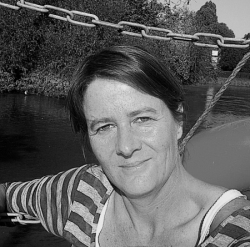This post comes to you from EcoArtScotland
 Glasgow Centre for Population Health‘s Seminar Series 12: Lecture 5 will feature Ruth Little speaking about Sea Change: Art, Place and Resilience.
Glasgow Centre for Population Health‘s Seminar Series 12: Lecture 5 will feature Ruth Little speaking about Sea Change: Art, Place and Resilience.
Tuesday 22nd March 2016
4.30 pm – 6.00 pm
Scottish Youth Theatre, 105 Brunswick Street, Glasgow G1 1TF
What can art and art-making contribute to fostering the coherence, capacity and connection that enable whole body health and adaptation, both social and individual? How can we better find our own place in living systems perpetually in motion where the stable patterns that once supported our lives are increasingly fragile?
Ruth Little works with artists and communities in the context of change: climate change, economic change, social change, sea change, and for many, short change. As associate director of Cape Farewell, a project which uses artistic creativity to instigate a cultural response to climate change, she is currently involved in a four year programme of interdisciplinary research, sailing expeditions, events, workshops and exhibitions across the islands of Scotland.
She brings to this work her award-winning skills as a dramaturg in theatre and dance. This is a role that is difficult to describe and has no easy synonym. It is essentially about discerning, revealing and expressing the connections and patterns which help us to make meaning from dramatic action or movement. As Ruth puts it: “Live performance is a living, evolving system: an assemblage of objects united by regular interaction or interdependence. And living systems all work in essentially the same way, no matter how big or small they are. Dramaturgy is, literally, the work of the actions, and the actions of living systems are patterned.â€
The themes of change, health, resilience and adaptation spring from this perspective. Growth and evolution are only possible when something changes, when the patterns are disturbed. “Meaning is, in effect, found not in the pattern itself, but in its disturbance, and the creation of new patterns. Knowledge lies at thresholds and edges of experience, and this is the place where dramaturgy happens.â€
It is also the place where, increasingly, most of us live our lives in a complex, rapidly changing world. How we adapt to change and disturbance at every level as individuals and as social beings is both a measure and a determinant of our health and wellbeing and is the basis of resilience.
Ruth Little is a theatre and dance dramaturg, a teacher and writer. She lectured in English Literature at the University of Sydney and was literary manager at Out of Joint, Soho Theatre, the Young Vic and the Royal Court. She is Associate Director at Cape Farewell where she is curating and producing Sea Change, a four-year programme of interdisciplinary research, sailing expeditions, events, workshops and exhibitions across the islands of Scotland. She is dramaturg with Akram Khan Company and has worked with Sadlers Wells, Spitalfields Festival, Barbican, National Theatre Connections, Fuel, Theatre Forum Dubln, Siobhan Davies Dance, Le Patin Libre. Winner of the 2012 Kenneth Tynan Award for dramaturgy. Recent publications include The Slow Art of Contemporary Expedition: Islandings and Art, Place, Climate: Situated Ethics
![]()
ecoartscotland is a resource focused on art and ecology for artists, curators, critics, commissioners as well as scientists and policy makers. It includes ecoartscotland papers, a mix of discussions of works by artists and critical theoretical texts, and serves as a curatorial platform.
It has been established by Chris Fremantle, producer and research associate with On The Edge Research, Gray’s School of Art, The Robert Gordon University. Fremantle is a member of a number of international networks of artists, curators and others focused on art and ecology.
Powered by WPeMatico


